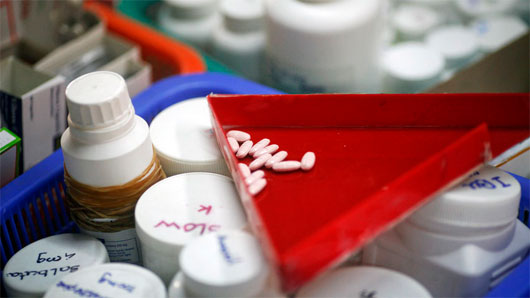Detecting bactericidal proteins that can replace antibiotics
An Israeli team of scientists has taken the first step in developing an antibiotic replacement, after successfully separating a bactericidal protein.
Detected substances prevent bacteria from branching, thereby destroying them and fighting infections.
According to Dr. Udi Qimron of Tel Aviv University, a member of the research team, viruses have a lot of phage (microbes) so they can use drugs made from these anti-virus phages.
Scientists have discovered one of the proteins produced by phage T7 , also called gene 04, that infects the host with E. coli intestinal bacteria and hinders cell division within the cell. of this type of bacteria. Because the separation of cells is prevented, the E. coli bacteria continue to last until death.
According to Dr. Qimron, this protein "has the potential to be an ideal antibiotic".

Photo: ghreat.uci.edu
The team now wants to explore the role of the phage gene T7 when producing more than 100 subunits per host in less than 25 minutes. If the T7 entity successfully completes the bacterial growth cycle, the host cell will be maximized.
According to Dr. Rotem Sorek, researcher at the Weizmann Institute of Science, this is the first major breakthrough in the battle between phage and bacteria. Although there is still a long way to go before the implementation phase, Sorek said that the study could "be the foundation for future antibiotic treatment".
Contrary to viruses, phage cannot harm humans. They attach themselves to a bacterium, inject DNA into the host and rapidly reproduce in the amount of up to 5,000 phages in a single bacterial cell. Bacterial cells continue to last until destroyed. Phages are the most common organism on Earth, with 10 times the amount of bacteria in nature.
For a long time, phages were considered as potential allies in the fight against infection in the human body and have been widely used in Eastern Europe. However, Western medicine almost eliminates them, partly because it is very localized compared to antibiotics.
Dr. Silvio Pitlik, an expert in infectious diseases, said bacteria know how to develop certain antibodies to fight phage because they have defense mechanisms. However, he said that in the future "phages will be used more because of the slow pace of detection of new antibiotics".
In recent decades, the antibiotic resistance of bacteria has increased significantly, making modern medicine sometimes impotent in fighting infections and infections.
The World Health Organization (WHO) has identified this problem as one of the biggest threats to public health.
- Find a new drug that can replace antibiotics
- New biocide from silver and titanium
- Does phage therapy return to replace antibiotics?
- What are antibiotics and classify antibiotics
- 'Heavenly' facts about antibiotics
- Find new antibiotics under the ocean
- Why do you know that antibiotics do not treat flu, many people continue to abuse?
- Detecting bacteria resistant to most antibiotics
- Antibiotics from dirt
- Honey can replace antibiotics
- Bad habits of parents hurt the liver and kidneys, endanger children
- 7 mistakes we often make when talking about antibiotics
 Green tea cleans teeth better than mouthwash?
Green tea cleans teeth better than mouthwash? Death kiss: This is why you should not let anyone kiss your baby's lips
Death kiss: This is why you should not let anyone kiss your baby's lips What is salmonellosis?
What is salmonellosis? Caution should be exercised when using aloe vera through eating and drinking
Caution should be exercised when using aloe vera through eating and drinking